Facebook Messenger as a Platform
iOS app design personal project
Project Overview
This project is a personal project with the attempt to solve the housework split issue when a bunch of people are sharing the same living space.
I started with the simple post-it note design, and ended up with a concept where Facebook Messenger can be utilized as an engaging platform for labor division and potentially more spaces.
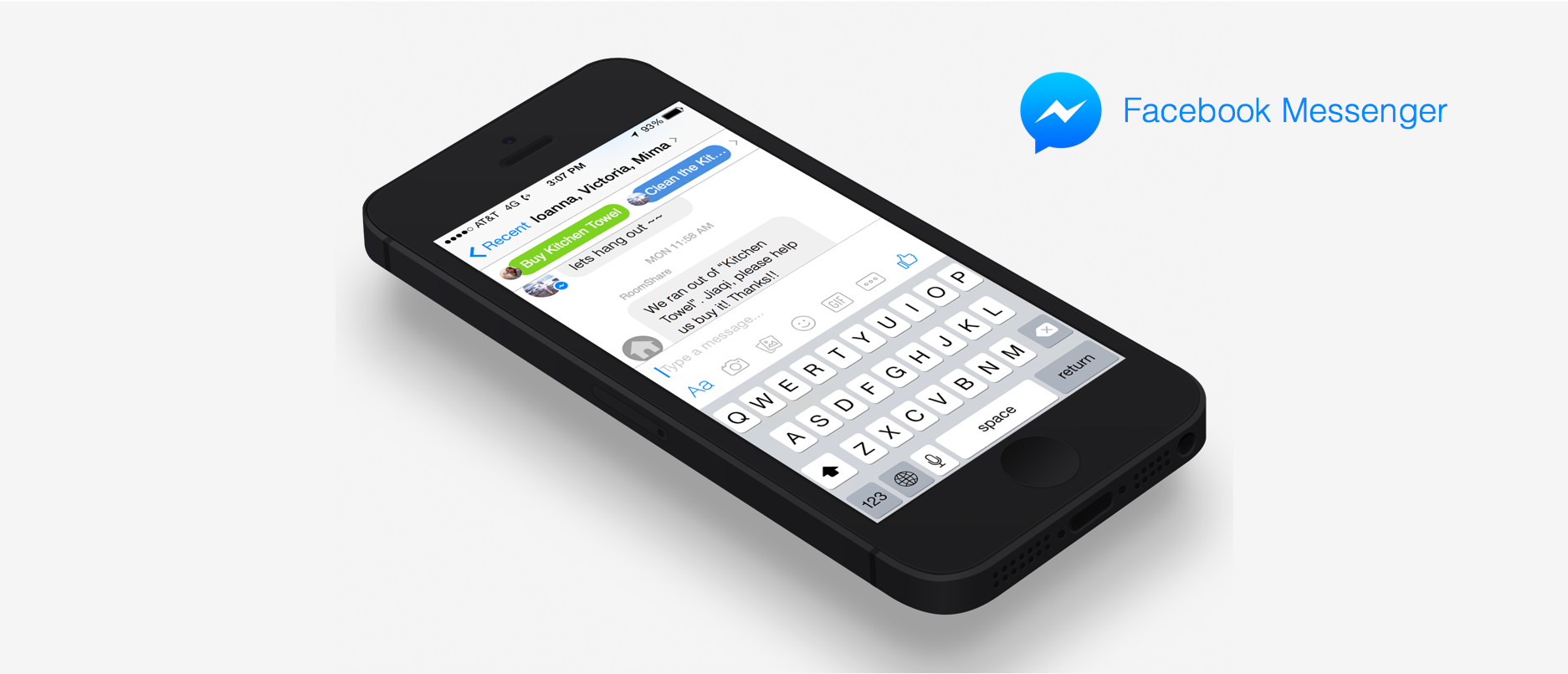
Why this project?
After graduation from Indiana University, I moved to San Francisco and started a shared life with 3 other girls in an apartment. We share the right to use the kitchen and bathroom, which also means that we share the responsibility to take turns cleaning kitchen/bathroom and purchasing kitchen/bathroom supplies like paper towel, hand soap etc.
There was always one girl remembering who's the next person taking charge of the tasks, which went well for a while. However, only after we went through some chaos during the two weeks when the girl travelled back home did we realize that we need more clarity on the task assignments. So I started exploring the possible solutions!
Release the Memory
The first deign I came up with was a Post-it Note Design, which was done really quick. There are two kinds of tasks that need to be assigned: weekly cleaning tasks and purchasing tasks whenever supplies run out. So I designed two kinds of Post-it Charts and put kitchen related tasks on refrigerator and bathroom related tasks on the closet door outside of bathroom.
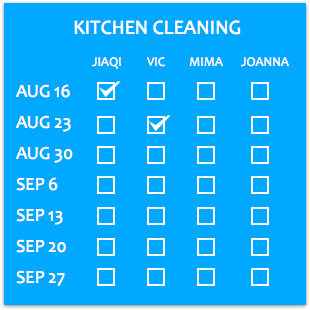
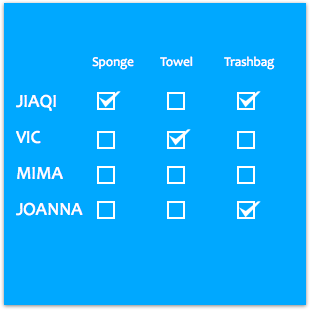
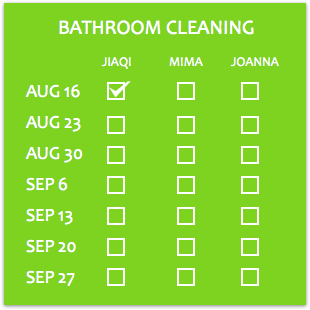
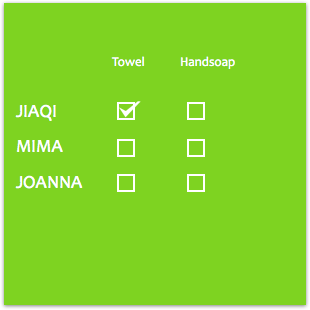
Evaluation:
This idea started well. In this case, we don't need a specific person to remember all the information, and there's more clarity on the information. Though after a few weeks I realized that it was not sustainable enough. After a few weeks, I have to redraw some of the post-it notes. Also the two kinds of post-it notes have two styles, which made us confused about what happened and who's next.
Let it be Sustainable
This Chore spreadsheet design made it more sustainable since it can include more dates. During this iteration, I tried to merge the two kinds of tasks (cleaning and purchasing) on one single spreadsheet but gave up on the idea because 1) the two kinds of tasks were completed in very different speeds (weekly vs. monthly); 2) people refer to the two kinds of tasks at different contexts (frequently vs. when ran out).
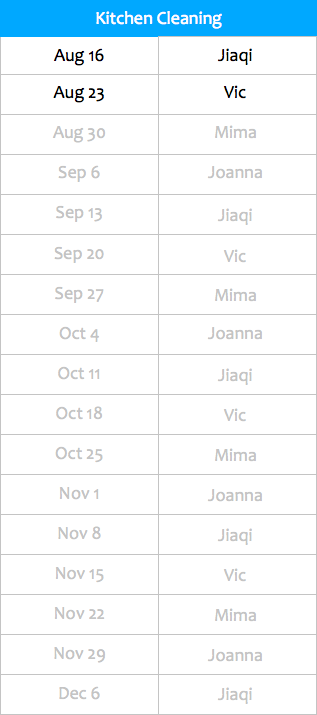



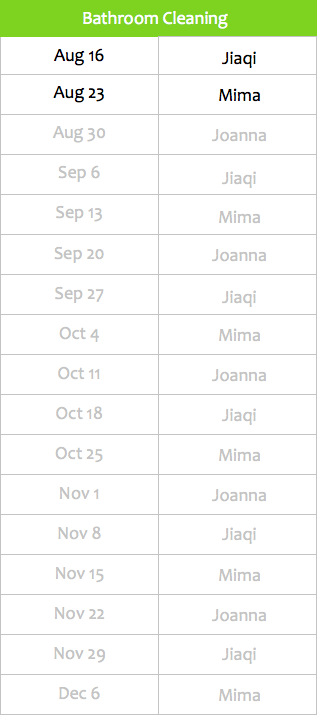


Evaluation:
This idea seemed to be okay, especially the supply purchasing tasks, as it is mostly used only for reference when needed. However, for cleaning tasks, it is hard to differentiate whether a cleaning task has been just completed or need to be completed since nobody remember the date of everyday...
Make clear the immediate action
This version of design took consideration of the problem discovered from the last version of design, and proposed an improved chore chart with an attached physical device as a task reminder. The color of the device changes over time. At first, the color of the device is light red. As time passes by, the intensity of the color increases. When it turns to bright red, it means that someone needs to clean now. People can shake the device to reset the color after cleaning.
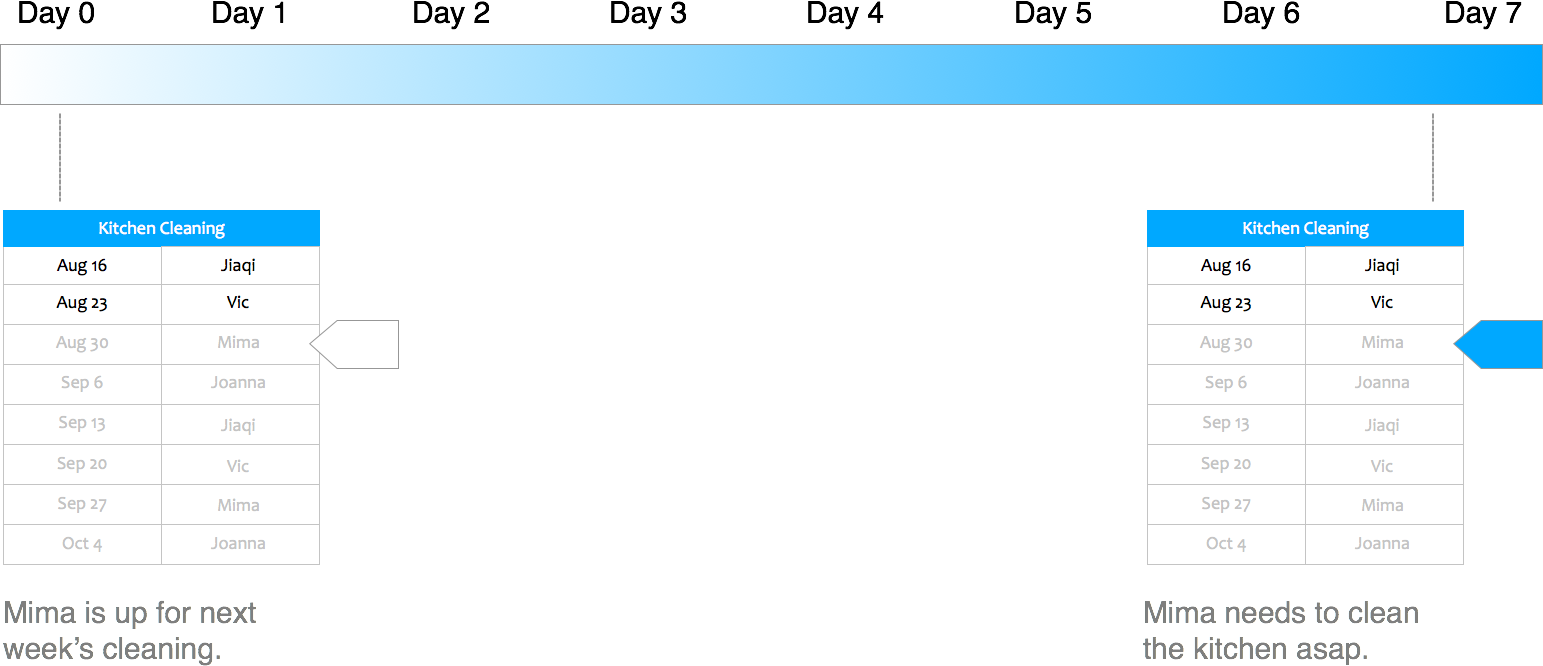
Evaluation:
This method may work well, though it may not be economic. If would be okay if we just design the two that we need in our apartment. But if we want to make it a product that other people also want to use at their houses, it might not be able to attract a lot of customers.
iOS App Design
The good thing about an app is that it can release people's memory to maximum degree. Instead of asking people to actively check whether it's time to do certain tasks, an app can send reminders when the time comes. In this app design, people can use their Facebook account to login, and then set up the tasks. The app will keep track of the tasks.
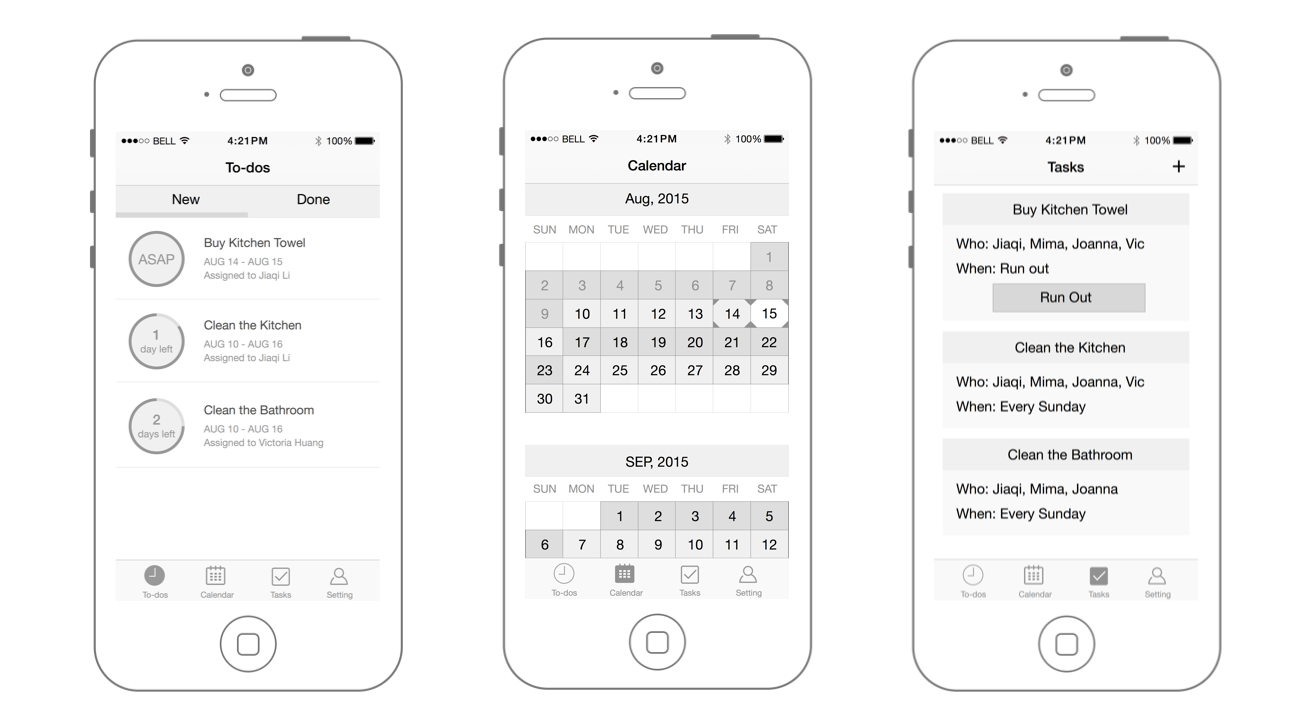
Evaluation:It's great that people can just wait to be reminded. However, the current design is not engaging enough and not collaborative enough. People may come to the app once a week, only to mark a task as completed, which seems to make the app not playful enough or even necessary. Also, although it seems efficient to know only my tasks, the team is isolated and communication is cut off. It becomes easier to blame other people for forgetting their tasks, although there might be a reason for that.
Facebook Messenger Plugin
How to make it more collaborative? How to make it more playful? When a roommate cleans kitchen, it's not just completing a task and done. Everyone else should not take the effort for cleaning kitchen or buying new supplies for granted, but should be grateful for it. A task assigned to a certain person does imply that the task should be remembered only by that person. We should not wait until someone didn't complete their task to blame the person, but should remind each other.
Actually that's how we've been doing it with utility split. After Mima pays our utility fee, she will let us know in our Facebook Messenger group. And then we'll communicate back after we send her the money. So why not utilize the platform also for cleaning and supply purchasing tasks?
The plugin is introduced to Facebook Messenger as a new member of the group. When it's time to clean or purchase new supplies, the app will send a message to the group as a reminder. Meanwhile, a new task will be added to task bar. After a person completes a task, the app will also send a message, which can be modified by user. But it will not stop here. As it happened before, everyone will say thank you to whoever just completes the task. Everyone is happy!
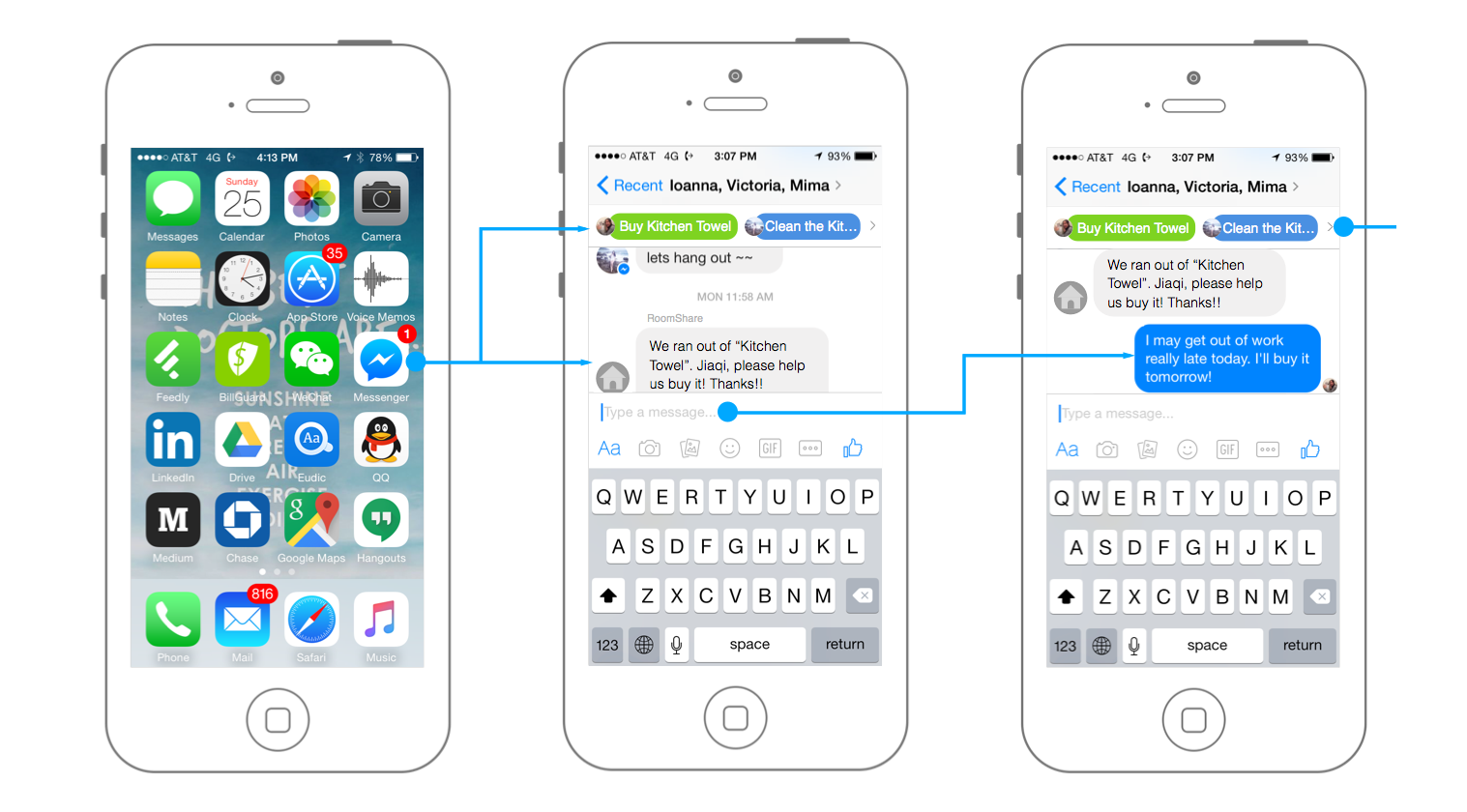
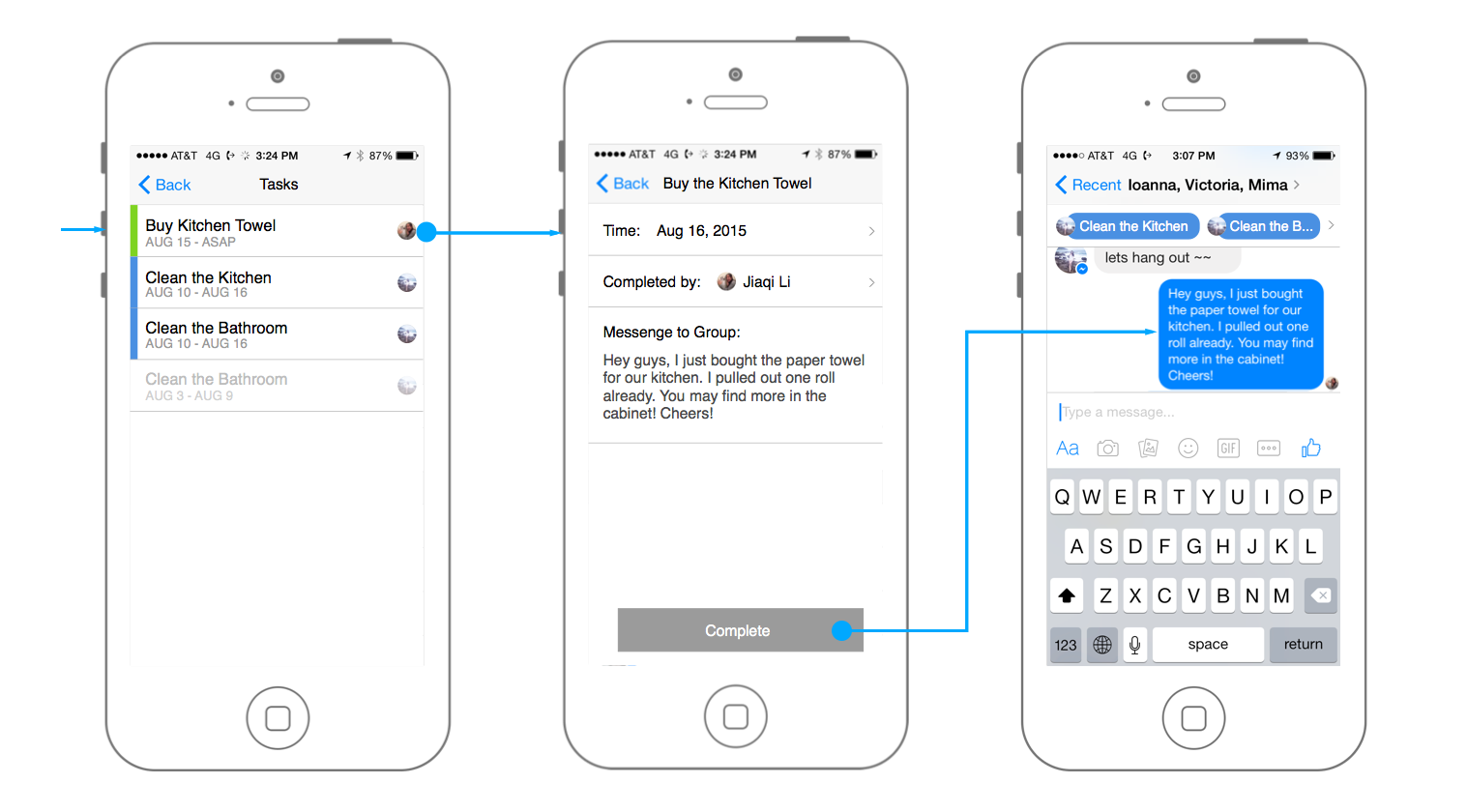
Evaluation:Let's assume that this design is feasible. This design is not just tracking tasks anymore, but it also engages users to remember and appreciate the effort as a group. Also, Facebook Messenger is an app that we use very frequently everyday. You may ignore other app's push notification, but not a Facebook message. :)
Facebook Messenger as a Platform
Facebook has already opened their Messenger App as a platform, but it has very limited usage:
"Any app can let people send images, videos, GIFs and sound clips through Messenger."
So actually our design is not allowed under the platform requirement.
But what if Facebook Messenger opens their platform to more possibilities? Like in this design, we can utilize it for labor division. It may also be helpful for health status check-in. Research shows that family support can help patients overcome their disease. What if the tasks a patient needs to complete are listed in the family chat group? Will it motivate the patient to keep fighting?
Of course, there are a lot of other things need to be well thought out. For example, we may not want the conversations around the tasks to be the only conversation we have; we need to come up with requirements to prevent message abuse. But it's definitely worth to explore new ways to utilize Facebook Messenger as it might be the largest and most frequently visited communication platform in the world.
LOCATION:
San Francisco, CA
DURATION:
One Month, August 2015